Students can Download Karnataka Class 10 Hindi निबन्ध-लेखन, KSEEB SSLC Class 10 Hindi Solutions helps you to revise the complete Karnataka State Board Syllabus and score more marks in your examinations.
Karnataka State Syllabus Class 10 Hindi रचना निबन्ध-लेखन
आ) निबन्ध-1:
जनसंख्या की समस्या Summary in English
Population Problem Summary in English:
Introduction to the matter: Population Problems is the problem of the world. There will be a birth of two babies for every second in this world. But in India, this problem has become the most burning issue. So for as area is concerned India stands in the 7th place. Amongst all the countries on this globe. But in Population, it stands in the second place. It is just one place below China, that stands first in Population. At present India has 100 crores of Population.
Reasons for population growth :
- On account of science and medical progress has been much developed, the death rate of just born babies is decreasing average life span of Indians has grown-up. So totally the death-rate has become less.
- Indians believe that children are gift of god. So they are not ready to follow the rules of family planning strictly.
- Most of the poor Indians believe that if there are more children in the house they may be used to earn money in one way or the other.
- Most of the people have no idea about the advantages of small size family.
- Most of the Indians are not interested in government activities to control population
- Population Explosion has very effect on the development of the nation. So most of our five year plans have become waste to control the population. If the population is not under control our national plans will be waste. The Population Problem leads to the unemployment problem. The growth of employment is very so if we compare with growth of Population. The youth of the country are engaged in destructive work. It leads to political indiscipline in the country.
The growth of the population may lead to many types of crimes. These crimes spoil the environment and the spoiled environment generates diseases. It results in an unhealthy society.
Nowadays, both central and state governments are planning a number of welfare plans for women’s and even in schools, ladies are taking education free of cost. So women must understand their responsibility and help the nation in controlling the Population. Everyone must understand that our family should have only two children so that our family will be happy.
जनसंख्या की समस्या Summary in Kannada
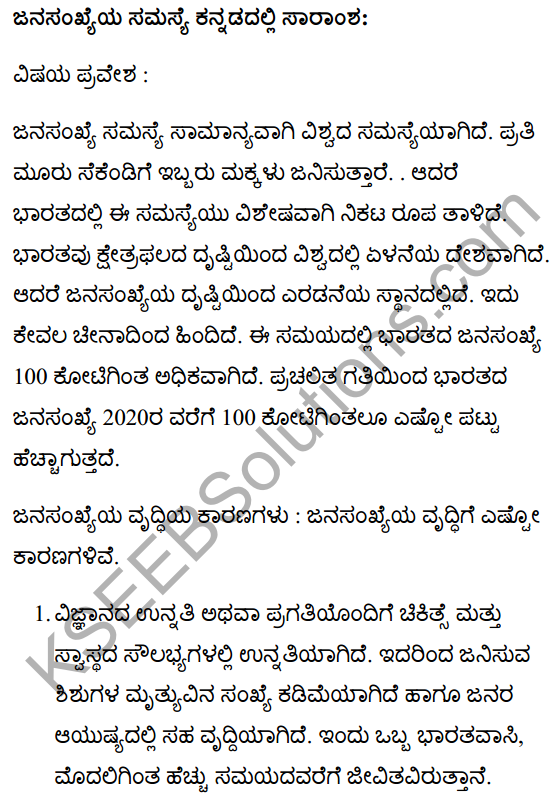
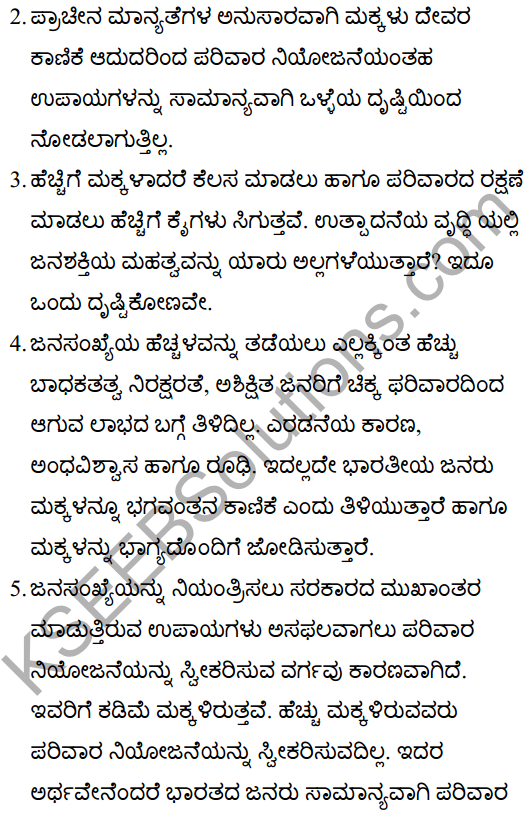
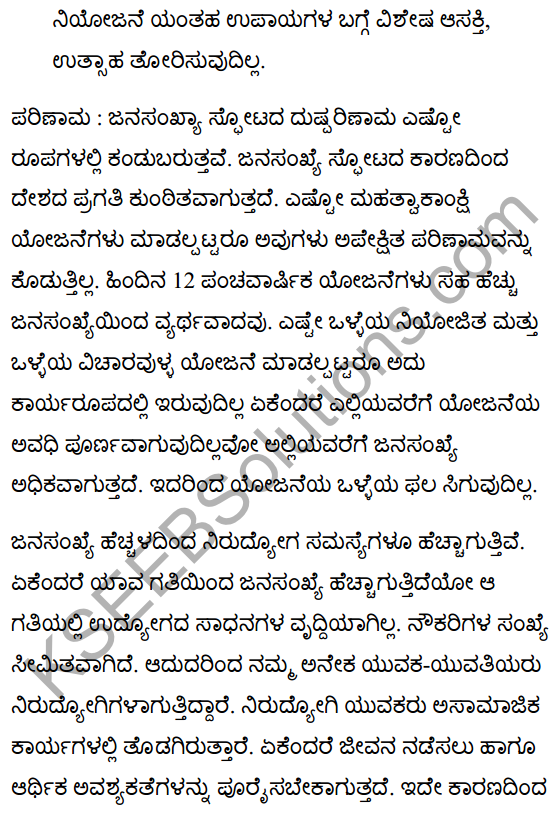
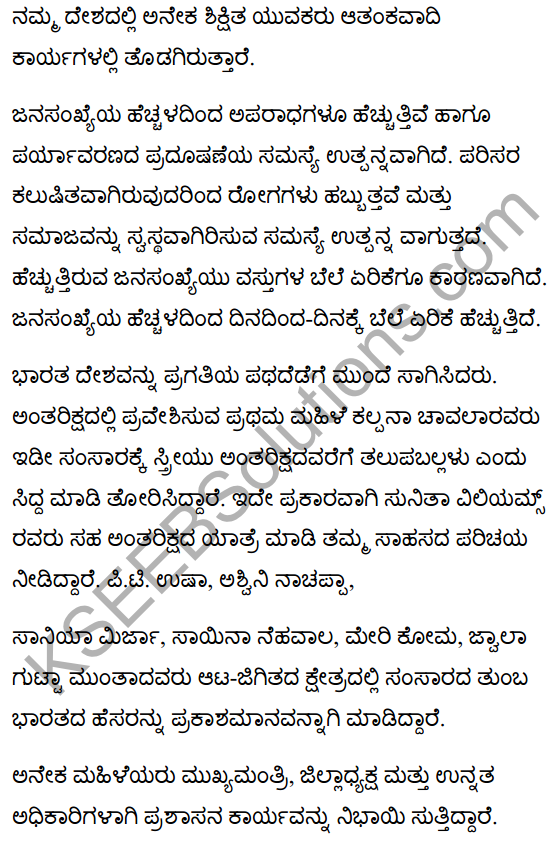
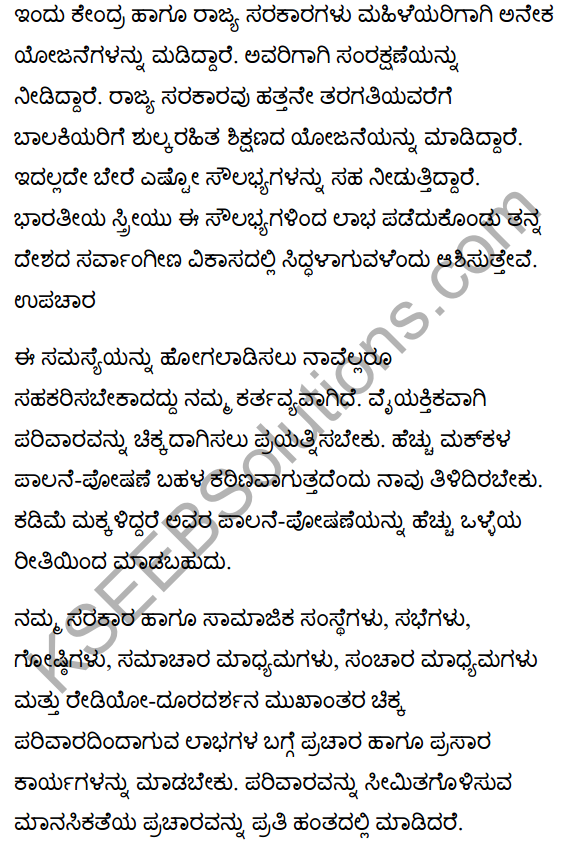
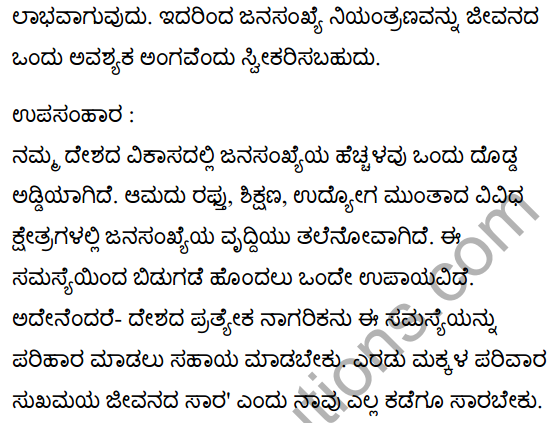
निबन्ध – 2:
नारी तुम केवल श्रद्धा हो Summary in English
Women Part Of Sincerity Summary in English:
There is a respectable place for ladies in India. Since ancient days women have been respected with trust and devotion. The woman is in the form of a mother, sister, wife and in many other forms. A man’s life is incomplete without a woman. There is a good wherever a woman is respected. Since the time of Veda and Upanishad, a woman has learnt different Shastras mathematics and science.
Our Indian rivers have been given women names like Ganga, Yamuna, Kaveri and Narmada. Thus a woman has been given maximum importance. But liberty has been taken away from her. A woman is under the shelter of her father in her childhood days and under the control of her husband and her children lastly. Now the situation has been changed and a woman is becoming equal to man in each and every field like science, education music, employment and politics. E.g. Sarojini Naidu became the first woman governor and showed Gandhi became the Primeminister of her India and showed her guts to the world.
नारी तुम केवल श्रद्धा हो Summary in Kannada
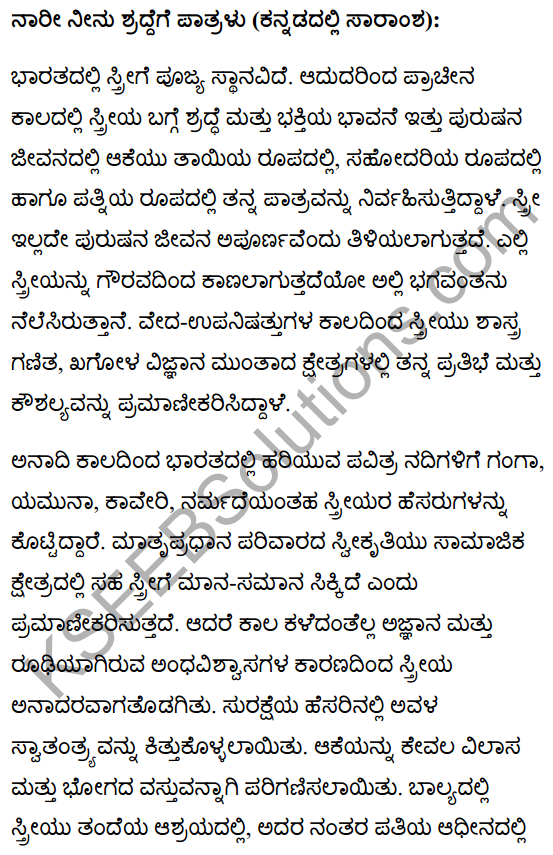
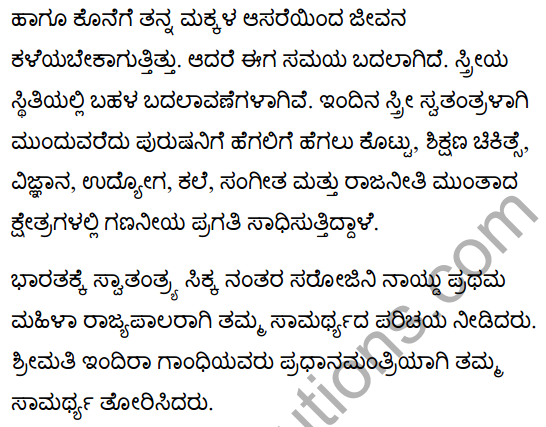
निबन्ध – अभ्यास
निबन्धों की रूपरेखा
I. पर्यटन का महत्व:
- विषय प्रवेश – पर्यटन का अर्थ
- पर्यटन-एक उद्योग
- विकास का सूत्रधार
- पर्यटन से लाभ
- पर्यटन-एक शौक
- उपसंहार ।
II. नागरिक के कर्तव्य
- विषय प्रवेश – ‘नागरिक’ के विभिन्न अर्थ, ‘नागरिक’ का रूढ़ अथवा व्यवहारिक अर्थ
- नागरिक – समाज और राष्ट्र .
- नागरिक के कर्तव्य अथवा नागरिकता के लक्षण
- नागरिक की पहचान
- नागरिक के अधिकार
- नागरिक और सरकार
- उपसंहार।
III. बेरोजगारी
- विषय प्रवेश – बेरोजगारी का तात्पर्य
- बेरोज़गारी के प्रकार – क. पूर्ण ख. आंशिक ग. शिक्षित घ. अशिक्षित वर्ग
- बेरोजगारी के दुष्परिणाम- अपराधों की वृद्धि, देश की प्रतिभा की अनुपयोगिता, राष्ट्रीय साधनों का अपव्यय
- बेरोज़गारी के कारण
- जनसंख्या में वृद्धि
- दोषपूर्ण शिक्षा-पद्धति
- उद्योग-धन्धों का अभाव
- बेरोजगारी दूर करने के उपाय
- उपसंहार ।
IV. महँगाई:
- विषय प्रवेश – महँगाई-एक व्यापक समस्या
- जीवन की मूल आवश्यकताएँ-रोटी, कपडा, मकान की पूर्ति में कठिनाई
- महँगाई के कारण
- महँगाई से उत्पन्न अपराध-चोरी, डकैती, भ्रष्टाचार आदि |
- महँगाई को दूर करने के उपाय
- उपसंहार।
V. वन महोत्सव:
- विषय प्रवेश – वन प्रकृति के आवश्यक अंग तथा मनुष्य के सहचर
- वृक्षों का उपयोग
- वृक्षों की उपयोगिता के बारे में वैज्ञानिकों का मत
- वनों से प्राप्त होने वाली विभिन्न वस्तुएँ, राष्ट्रीय आय के साधन
- वनों का नाश
- वृक्षारोपण अथवा वन महोत्सव की परम्परा – सन् 1950 में प्रसिद्ध स्वतन्त्रता सेनानी एवं साहित्यकार कन्हैयालाल माणिकलाल मुंशी द्वारा आरम्भ, तदुपरांत चिप्को आन्दोलन
- उपसंहार ।
भ्रष्टाचार की समस्या।
भ्रष्टाचार का अर्थ है – अनैतिक अथवा अनुचित व्यवहार। आज देश में चारों ओर भ्रष्टाचार फैला हुआ है। यदि समय रहते इस पर नियंत्रण नहीं किया गया तो सारे देश का वातावरण बिगड़ सकता है। मनुष्य बड़ा लालची है। वह बहुत कुछ पाने के लिए अनैतिक मार्ग अपनाता है। इस प्रकार भ्रष्टाचार बढ़ता जाता है। भाषावाद, क्षेत्रीयता, जातीयता आदि से भी भ्रष्टाचार बढ़ता है।
भ्रष्टाचार के अनेक रूप हैं। चोरबाजारी, रिश्वतखोरी, दल-बदल, जोर-जबरदस्ती – ये सब भ्रष्टाचार के ही रूप हैं। धर्म का नाम लेकर लोग अधर्म का काम करते हैं। अधिकार, कुर्सी के लिए भी भ्रष्टाचार पनपता है। परिणामतः समाज में भय, आक्रोश व चिंता का वातावरण बनता है। यह हमारी व्यवस्था को बिगाड़ता है। भ्रष्टाचार विकास की प्रगति में बाधा है। आजकल सेना में भी इसकी चर्चा सुनी गई है जो हमारे लिए चिंता का विषय है।
भ्रष्टाचार किसी एक व्यक्ति की नहीं, बल्कि संपूर्ण समाज और देश की समस्या है। इनका पूर्णविनाश सामूहिक प्रयास से ही संभव है। इसके लिए शासन की इच्छा शक्ति होना जरूरी है। भ्रष्टाचार के आरोपियों को कठोर से कठोर दंड देना चाहिए। भ्रष्टाचार को मिटाने के लिए सरकार, समाज और प्रत्येक नागरिक को मिलकर कार्य करना चाहिए। लगता है, हमारी शिक्षण प्रणाली में कई कमियाँ हैं, सामाजिक नैतिकता की कमी होना अच्छा नहीं है। आइए, हम संकल्प करें कि न हम रिश्वत देंगे और न रिश्वत लेंगे।
दहेज प्रथा।
हम प्रतिदिन समाचार-पत्रों में पढ़ते हैं कि दहेज के कारण अमुक युवती की हत्या की गई, अमुक लड़की ने आत्महत्या कर ली, अमुक स्त्री को प्रताडित किया गया और अमुक महिला को घर से निकाल दिया गया। वास्तव में दहेज प्रथा हमारे समाज के लिए और हमारे देश के लिए एक बहुत-बड़ा कलंक है।
माता-पिता द्वारा अपनी पुत्री को इच्छानुसार जो वस्तुएँ, धन-संपत्ति विवाह के समय दी जाती थी, वही दहेज माना जाता था। लेकिन इस पद्धति में परिवर्तन होते गए। विवाह से पूर्व ही वर-पक्ष की ओर से दहेज के रूप में कई माँगें रखी जाने लगी। परिणाम-स्वरूप समाज में कई विसंगतियाँ शुरू हो गई।
दहेज के कारण प्रायः लड़कियों को ही कष्ट भोगना पड़ता है। यह पद्धति अमीर, गरीब सभी में देखी जा रही है। अमीर तो जैसे-तैसे दे देगा, परन्तु गरीब क्या देगा? फिर यहीं से शुरू होता है अत्याचार। नवविवाहितों की प्रताड़ना, उनकी हत्या, उन्हें जलाना जैसे अमानवीय कृत्य बढ़ जाते हैं।
यद्यपि दहेज-प्रथा के विरोध में कई कानून बने हुए हैं, कई सामाजिक संस्थाओं द्वारा भी दहेज न लेने के लिए प्रचार किया जाता है; फिर भी यह कलंक अभी मिटा नहीं है। वर-वधु दोनों पक्षों को चाहिए कि वे न दहेज लें और न दें। वास्तव में समाज में इसके लिए जागृति होनी चाहिए। हमें उनका बहिष्कार करना चाहिए जो दहेज लेते या माँगते हैं। तभी हम दहेज-विहीन समाज का निर्माण कर पायेंगे।
स्वतंत्रता-दिवस।
स्वतंत्रता-दिवस अर्थात् 15 अगस्त हमारे देश के इतिहास का यह स्वर्णिम-दिन है। इसी दिन हमारा देश अंग्रेजों की गुलामी से छुटकारा पाकर स्वतंत्र हुआ था। लालकिले पर देश के प्रथम प्रधानमंत्री पं. नेहरू जी ने तिरंगा झंडा फहराया था।
देश की आजादी के लिए भारतीयों ने एक लम्बी लड़ाई लड़ी थी। हजारों-लाखों के बलिदान के पश्चात् हमें यह आजादी मिली है। इस स्वतंत्रता के लिए 1857 को सबसे पहले क्रांति हुई थी। उसी से प्रेरणा लेकर, आगे लोकमान्य तिलक, दादाभाई नौरोजी, गोपालकृष्ण गोखले, लाला लाजपतराय, महात्मा गाँधी जैसे अनेकानेक देशभक्तों ने 1947 तक आन्दोलन किये।
यद्यपि कुछ हद तक गाँधीजी के नेतृत्व में यह सत्य और अहिंसा की लड़ाई थी, फिर भी आजादी की लड़ाई में बहुत-बड़ी संख्या में देशभक्त शहीद हुए हैं। इस बात को हमें नहीं भूलना चाहिए। इस लड़ाई के संदर्भ में अंग्रेजों ने भारतीयों पर बहुत-बड़े अत्याचार किए थे, लाठियाँ बरसाई, देशभक्तों को जेलों में दूंस दिया और गोलियाँ भी बरसाई गई। अंत में अंग्रेजों को हार माननी पड़ी और वे 15 अगस्त 1947 को अपना बोरिया-बिस्तर समेटकर चले गए।
तब से प्रतिवर्ष 15 अगस्त को सम्पूर्ण देश में स्वतंत्रता दिवस मनाया जाता है। देश के प्रधानमंत्री दिल्ली में राष्ट्रध्वज फहराते हैं। नगर-नगर, गाँव-गाँव में प्रभात-फेरियाँ निकलती हैं। देशभक्ति के गीतों की गूंज हर कहीं सुनाई देती हैं। नेताओं के भाषण होते हैं। सांस्कृतिक कार्यक्रमों के आयोजन होते हैं। बलिदानियों को स्मरण कर, उन्हें श्रद्धांजलि दी जाती है। हमारा कर्तव्य है कि हम इस आजादी को बनाये रखें। देश-द्रोहियों को करारा जवाब दें।
पुस्तकालय।
मनुष्य के जीवन में ज्ञान का बड़ा महत्व है। ज्ञान-प्राप्ति केवल स्कूल-कॉलेजों में ही नहीं, बल्कि पुस्तकालय में भी होती है। सचमुच पुस्तकालय पवित्र तीर्थस्थान है। यह एक सरस्वती का पावन मंदिर है।
पुस्तकालय में साहित्य, विज्ञान, इतिहास, राजनीति, कला, दर्शनशास्त्र आदि अनेक विषयों की पुस्तकें होती हैं। उनमें कुछ संदर्भ ग्रंथ और शब्दकोश भी होते हैं। धनवान भी सभी विषयों की पुस्तकें नहीं खरीद सकता। समृद्ध पुस्तकालयों में दैनिक व साप्ताहिक समाचार-पत्र भी मंगाए जाते हैं।
कोई भी व्यक्ति ऐसे सार्वजनिक पुस्तकालय से लाभ उठा सकता है। पुस्तकालय का सदस्य बन सकता है। पुस्तकें पढ़ने के लिए अपने घर भी ले जा सकता है। इस प्रकार मनुष्य पुस्तकालयों से ज्ञान-सागर में डुबकी लगा सकता है।
जब भी समय मिले, तो पुस्तकालय में जाकर समय बिताना लाभकारी है। महान लेखकों की पुस्तकें पढ़ने और मनोरंजन करने, ज्ञान-विकास के लिए पुस्तकालय बड़े उपयोगी हैं। देश-विदेश का साहित्य पढ़ने से लोगों में जागृति होती है। पुस्तकालय समाज और देश के लिए हितकारी है।
पुस्तकालय सबके लिए सुलभ हों, शुल्क कम हों, ताकि साधारण व्यक्ति भी उसका लाभ उठा सके। उसमें अच्छी पुस्तकों का संग्रह हो। पुस्तकालय दिनभर खुला हो। सचमुच पुस्तकालय ज्ञान का दीपक है। भारत के प्रत्येक गाँव में पुस्तकालय होने चाहिए।
राष्ट्रीय एकता।
आज हमारा भारत देश स्वतंत्र है। इस स्वतंत्रता को पाने के लिए हम सभी भारतवासियों ने एकता के सूत्र में बंधकर ही प्रयास किया था। क्योंकि एकता में बहुत बड़ी ताकत होती है। अलग-अलग पाँच लकड़ियों को मिनटों में तोड़ा जा सकता है, परन्तु उन्हीं पाँच लकड़ियों के एक गढे को तोड़ना नामुमकिन है। यह है एकता की शक्ति।
व्यक्ति-व्यक्ति में एकता, समाज-समाज में एकता जैसे होती है, वैसे ही ‘राष्ट्रीय-एकता’ की बहुत आवश्यकता है। बिना एकता के कोई भी कार्य सफल नहीं हो सकता। बिना एकता के कोई संस्था अथवा संगठन भी खड़ा नहीं हो सकता। जिस देश में एकता नहीं होती है, वह कदापि विकास नहीं कर सकता, वह कदापि राष्ट्रोन्नति में सफल नहीं हो सकता।
हमारे देश में करीब पाँच सौ वर्षों तक मुगलों ने और करीब दो सौ वर्षों तक अंग्रेजों ने राज्य किया। इसका कारण भी यही है कि हममें (भारतीयों में) उस समय एकता नहीं थी। उस अनेकता के कारण ही हम गुलाम रहे और हमने बहुत-कुछ खोया।
जब हम जागृत हुए, हमारा सोया हुआ भारत जाग उठा और हमने एकता का महामंत्र फूंका तो नतीजा यह हुआ कि शत्रु भाग खड़े हुए। एकता से आजादी मिली, एकता से हमने विकास किया, एकता से हम आगे बढे और एकता से ही हम फिर विश्वगुरु बनने के लिए अग्रसर हैं। संगठन में शक्ति होती है, यह समझकर ही हम ‘राष्ट्रीय एकता’ के प्रहरी बने हुए हैं।
कम्प्यू टर
आज का युग कंप्यूटर का युग है। कंप्यूटर एक ऐसा मशीनी मस्तिष्क है जो ऐसे-ऐसे कार्य करने में सक्षम हैं जो मनुष्य की पहुंच के बाहर हैं। लाखों, करोड़ों व इससे भी अधिक संख्याओं की गणनाएँ यह पलक झपकते ही करने की क्षमता रखता है।
सबसे बड़ी विशेषता इसकी यह है कि भले ही मनुष्य इसके उपयोग में किसी प्रकार की कोई गलती कर दे, लेकिन यह सही सूचना देने में पूर्णतया सफल होता है।
आज कंप्यूटर सभी कार्यालयों, विभागों, विद्यालयों, बैंक, रेल्वे स्टेशन, बस-स्टैंड, हवाई अड्डों, दुकानों तक में पूर्ण सहयोगी है। मनोरंजन के साधनों में भी इसका जवाब नहीं। बच्चों के अलावा बड़े भी इसके मनोरंजन से प्रसन्न रहते हैं।
किसी भी व्यक्ति को यदि बंद कमरे में कंप्यूटर देकर बिठा दिया जाए तो शायद वह स्वतंत्र घूमने वाले प्राणी से अधिक प्रसन्न होगा। वैज्ञानिक क्षेत्र में देश-विदेश व अंतरिक्ष के कार्य कंप्यूटर के सहारे ही होते हैं। अंतरिक्ष के संबंध भी यही स्थापित करता है। इंटरनेट इसकी विशेष देन है। कुछ ही क्षणों में हम अपने प्रत्येक कार्य हेतु पूरे विश्व से सूचनाएँ प्राप्त कर सकते हैं। चिकित्सा के क्षेत्र में हर बीमारी की जाँच कंप्यूटर बखूबी करता है। लेकिन कई बार बच्चे व कुछ लोग इसका गलत प्रयोग कर स्वयं ही गुमराह होते हैं, जोकि गलत है। हमें इस उपयोगी साधन का सकारात्मक रूप से ही प्रयोग करना चाहिए।
खेलों का महत्व।
जीवन में खेलों का महत्वपूर्ण स्थान है। स्वास्थ्य के लिए खेल जरूरी है। मानसिक शांति के लिए भी खेल जरूरी है। खेल कई तरह के होते हैं। जैसे – देशी खेल और विदेशी खेल। आंतरिक खेल और बाहरी (मैदानी) खेल।
प्रायः देखा जाता है कि गाँवों में गुल्ली-डंडा, लंगड़ी, आँख-मिचौनी, चील-झपट, खो-खो, कबड्डी जैसे कई खेल खेले जाते हैं। इन खेलों से मनोरंजन तो होता ही है, साथ-साथ इनसे हमारा शरीर स्वस्थ, हृष्ट-पुष्ट भी रहता है। गाँवों में और भी कई मजेदार खेल खेले जाते हैं। आजकल गाँवों के खेल शहरों में खेले जाने लगे हैं। इससे प्रेम, भाईचारा बढ़ता है।
देशी खेलों के अतिरिक्त विदेशी खेल भी खेले जाते हैं। जैसे – क्रिकेट, हॉकी, फुटबॉल, वॉलीबाल आदि। विदेशी खेल देशी खेलों से महँगे होते हैं। खेलों को बढ़ावा देने के लिए स्कूल-कॉलेजों में प्रतियोगिताएँ, टूर्नामेंट आदि होते हैं। जीतनेवाले उत्तम खिलाड़ियों को प्रोत्साहित करने के लिए उन्हें पुरस्कार दिए जाते हैं, उनका सम्मान किया जाता है। अनेक बड़ी-बड़ी कंपनियाँ अच्छे खिलाड़ियों को अपने यहाँ नौकरी भी देती हैं।
खेल में खेल की भावना हो तो उसका कुछ मजा ही अलग है। खेल भी शिक्षा का आवश्यक अंग माना गया है। इससे खेलों का महत्व बढ़ गया है।
समय का सदुपयोग।
समय एक अनमोल वस्तु है। खोया हुआ समय कभी हाथ नहीं आता। हमारे जीवन की सफलता का आधार समय के सदुपयोग पर है। जो व्यक्ति समय का सदुपयोग करता है, वह अपने जीवन में उज्ज्वल सिद्धि प्राप्त कर सकता है। . जो लोग समय के महत्व को नहीं समझते हैं, वे अपने समय का दुरुपयोग करते हैं। सुबह देरी से उठना और उठने के बाद आधा घंटा आलस्य मिटाने में लगाना, गप्पें हाँकना, दूसरों की निंदा करना आदि में अपना काफी समय बरबाद करना ये सब उचित नहीं।
यदि हम महापुरुषों की जीवनियाँ पढ़ेंगे, तो समय के महत्व का पता चलेगा। समय के सदुपयोग ने ही उनको अमर कीर्ति प्रदान की है। ज्ञान, धन, कीर्ति, कुशलता आदि प्राप्त करने के लिए समय का सदुपयोग करना अनिवार्य है।
समय का सदुपयोग करने के लिए हमें प्रत्येक काम ठीक समय पर करना चाहिए। अध्ययन, व्यायाम, समाजसेवा, मनोरंजन और अन्य सभी काम ठीक-ठीक समय पर करना चाहिए। ऐसा करने पर काम का बोझ महसूस नहीं होगा। समय को दुर्लभ सम्पत्ति मानकर उसका सदुपयोग करना चाहिए।
अनुशासन की आवश्यकता।
अनुशासन का अर्थ है – शासन का अनुसरण करना अर्थात् शासन के नियम और नियंत्रण के अधीन रहना। अनुशासित जीवन ही सच्चा जीवन माना जाता है। जीवन के प्रत्येक क्षेत्र में अनुशासन का होना नितांत जरूरी है।
यदि हम अनुशासन का पालन नहीं करेंगे, नियमों को तोड़ेंगे, तो फिर गड़बड़ी हो जायेगी और चारों तरफ अव्यवस्था फैल जायेगी। अतः व्यवस्था को बनाये रखने के लिए अनुशासन का होना जरूरी है।
अनुशासन किसी एक क्षेत्र के लिए सीमित नहीं है। अनुशासन नीचे से ऊपर तक, छोटे से बड़े तक, अमीर से गरीब तक, प्रजा से शासक तक अर्थात् प्रत्येक क्षेत्र में यत्र-तत्र-सर्वत्र अनुशासन की आवश्यकता है। यदि विद्यार्थी को विद्यालय में, खेल के मैदान में, छात्रावास में, घर-परिवार में, सार्वजनिक स्थानों में पालन करने का अभ्यास हो जाए तो वह जीवन भर अनुशासित रहेगा। अतः जरूरी है कि अध्यापक विद्यार्थियों को अनुशासन सिखाएँ।
कहते हैं, बाल्यावस्था में जो अच्छी बातें सीख ली जाती हैं, उनका अच्छा असर भी जीवन-पर्यंत होता है। अतः अच्छे नागरिक बनने के लिए भी अनुशासन की आवश्यकता है और अच्छे शासक के लिए भी अनुशासन की आवश्यकता है।
नागरिक के कर्तव्य।
प्रत्येक नागरिक अपने जीने के लिए सदा कुछ अधिकारों की इच्छा रखता है। उसे यह भी जानना होगा कि अधिकारों की माँग के साथ-साथ कुछ कर्तव्यों का भी पालन करना पड़ता है। यह बात एक परिवार, एक समाज, एक गाँव या शहर तथा एक देश के लिए भी लागू होती है।
भारत 15 अगस्त 1947 को स्वतंत्र हुआ। हम स्वतंत्र देश के नागरिक हैं। जब हम गुलाम थे, तो न हमें कोई अधिकार था और न कोई कर्तव्य । अब हम स्वतंत्र देश के स्वतंत्र नागरिक होने के नाते हमें कुछ मौलिक अधिकार मिले हैं, तो कुछ मौलिक कर्तव्य भी।
अधिकार और कर्तव्य एक सिक्के के दो पहलू के समान हैं। बिना कर्तव्य के अधिकार का कोई महत्व नहीं है। कर्तव्य अधिकार का एक अभिन्न अंग है। जो किसी एक व्यक्ति के लिए कर्तव्य है, वही दूसरे के लिए अधिकार है।
भारतीय संविधान के भाग-4क, अनुच्छेद 51 क में मूल कर्तव्य शामिल किए गए हैं। इसके अनुसार भारत के प्रत्येक नागरिक का यह कर्तव्य होगा कि वह –
- संविधान का पालन करे और उसके आदर्शों, संस्थाओं, राष्ट्रध्वज और राष्ट्रगान का आदर करे;
- स्वतंत्रता के लिए हमारे राष्ट्रीय आंदोलन को प्रेरित करने वाले उच्च आदर्शों को हृदय में संजोए रखे और उनका पालन करे;
- भारत की प्रभुता, एकता और अखंडता की रक्षा करे और उसे अक्षुण्ण रखे;
- देश की रक्षा करे और आह्वान किए जाने पर राष्ट्र की सेवा करे;
- भारत के सभी लोगों में समरसता और समान भ्रातृत्व की भावना का निर्माण करे जो धर्म, भाषा और प्रदेश या वर्ग पर आधारित सभी भेदभाव से परे हो; ऐसी प्रथाओं का त्याग करे जो स्त्रियों के सम्मान के विरुद्ध है;
- हमारी सामाजिक संस्कृति की गौरवशाली परंपरा का महत्व समझे और उसका परिरक्षण करे;
- प्राकृतिक पर्यावरण की, जिसके अंतर्गत वन, झील, नदी और वन्य जीव हैं, रक्षा करे और उसका संवर्धन करे तथा प्राणी मात्र के प्रति दयाभाव रखे।
- वैज्ञानिक दृष्टिकोण, मानववाद और ज्ञानार्जन तथा सुधार की भावना का विकास करे;
- सार्वजनिक संपत्ति को सुरक्षित रखे और हिंसा से दूर रहे;
- व्यक्तिगत और सामूहिक गतिविधियों के सभी क्षेत्रों में उत्कर्ष की ओर बढ़ने का सतत प्रयास करे जिससे राष्ट्र निरंतर बढ़ते हुए प्रयत्न और उपलब्धि की नई ऊँचाइयाँ को छू ले;
- यदि माता-पिता या संरक्षक है, छह वर्ष से चौदह वर्ष तक की आयु वाले अपने, यथास्थिति, बालक या प्रतिपाल्य के लिए शिक्षा के अवसर प्रदान करे।
उपर्युक्त नागरिक कर्तव्यों का पालन कराने या उनका उल्लंघन होने पर दंड देने के लिए संविधान में कोई उपबंध नहीं है। मूल कर्तव्यों का पालन कराने का एकमात्र तरीका यह है कि लोगों को नागरिकता के मूल्यों तथा कर्तव्यों के बारे में शिक्षित किया जाए और उनमें पर्याप्त जागृति उत्पन्न की जाए तथा एक ऐसे अनुकूल वातावरण का निर्माण किया जाए जिसमें प्रत्येक नागरिक अपने सवैधानिक कर्तव्यों का पालन करने तथा समाज के प्रति अपना ऋण चुकाने में गर्व तथा बंधन का अनुभव करे।
इंटरनेट – वरदान है या अभिशाप / इंटरनेट से लाभ / इंटरनेट का महत्व।
अर्थ : इंटरनेट विश्व के विभिन्न स्थानों पर स्थापित कम्प्यूटरों के कई अंतर्जालों का एक दूसरे से संबंध स्थापित करने का जाल है, जिस पर सूचना एक स्थान से दूसरे स्थान तक शीघ्र पहुँच जाती है। इंटरनेट के द्वारा सूचनातंत्र मानव की मुट्ठी में बंद होता जा रहा है।
लाभ : इंटरनेट ने मीडिया और समाचार माध्यमों के पूरे कार्य पर व्यापक प्रभाव डाला है। इंटरनेट ने हर प्रकार के व्यवसाय को एक नया स्वरूप प्रदान किया है। विश्व के अधिकांश समाचार पत्र ऑनलाइन हो गये है। अनेक ऐसी वेबसाइट हैं, जो ऑनलाइन शिक्षा, मनोरंजन आदि प्रदान कर रही हैं।
- ई-बैंकिंगः इन्टरनेट ने बैंकिंग क्षेत्र में भी नए युग का सुत्रपात किया है। बैंकिंग कार्यप्रणाली में ई-बैंकिंग, पी.सी. बैंकिंग, मोबाइल बैंकिग का प्रयोग बढ़ता जा रहा है।
- ई-कामर्स : इन्टरनेट के द्वारा अब लोग अपने घरों से ही समस्त व्यापारिक कार्यों का संचालन कर रहे हैं।
- सूचनाओं का आदान-प्रदान : इन्टरनेट से किसी भी विषय से संबंधित सूचना प्राप्त की जा सकती है। ४) विपणन/खरीदारी: इन्टरनेट द्वारा खरीदारी एक तरह का फैशन बन गया है।
- विज्ञापन : व्यावसायिक कंपनियाँ इंटरनेट के माध्यम से विज्ञापन कराती है।
- चिकित्सा : चिकित्सा के क्षेत्र में भी इंटरनेट लाभकारी है। भारतीय चिकित्सक अपने कंम्प्यूटर द्वारा विदेशी चिकित्सा पद्धति को समझ सकते हैं। इंटरनेट ने मनोरंजन के बिखरे हुए क्षेत्र को समेटकर खुशबूदार बना दिया हैं।
दुष्परिणामः इंटरनेट ने जहाँ युवा पीढ़ी को फायदा पहुंचाया है तो इसके नुकसान भी है। विद्यार्थी अपना अधिकांश समय व्हाट्सएप्प, फेसबुक, ट्विटर पर बिताते हैं। इंटरनेट ने मनुष्य के जीवन में गोपनीयता को भी खत्म किया है। इंटरनेट पर अनेक अश्लील साहित्य मौजूद है जिससे आज की युवा पीढ़ी पर बुरा असर पढ़ रहा है। कई बार इंटरनेट के माध्यम से जनता को भ्रमित भी कर दिया जाता है।
उपसंहार : इंटरनेट ने आज पूरी दुनियाँ को एक विश्वग्राम (Global Village) में बदल दिया है। इंटरनेट के माध्यम से सूचना की उपलब्धता बहुत आसान हो गयी है। हमें इंटरनेट के सही उपयोग पर ध्यान देना चाहिए।
स्वच्छ भारत अभियान / स्वच्छता का महत्व।
स्वस्थ जीवन जीने के लिए स्वच्छता का विशेष महत्व है। आरोग्य को नष्ट करने के जितने भी कारण हैं, उनमें गन्दगी प्रमुख है। बीमारियाँ गन्दगी में ही पलती हैं। जहाँ कूड़े-कचरे के ढेर जमा रहते हैं, मल-मूत्र सड़ता है, नालियों में कीचड़ भरी रहती है, सीलन और साड़न बनी रहती है, वहीं मक्खी, पिस्सू, खटमल जैसे बीमारियाँ उत्पन्न करने वाले कीड़े उत्पन्न होते हैं। कहना न होगा कि हैजा, मलेरिया, दस्त, पेट के कीड़े, चेचक, खुजली, रक्त-विकार जैसे कितने ही रोग इन मक्खी, मच्छर जैसे कीड़ों से ही फैलते हैं।
महात्मा गांधी ने अपने आसपास के लोगों को स्वच्छता बनाए रखने संबंधी शिक्षा प्रदान कर राष्ट्र को एक उत्कृष्ट संदेश दिया था। उन्होंने ‘स्वच्छ भारत’ का सपना देखा था। वे चाहते थे कि भारत के सभी नागरिक एक साथ मिलकर देश को स्वच्छ बनाने के लिए कार्य करें। महात्मा गांधी के स्वच्छ भारत के स्वप्न को पूरा करने के लिए, प्रधानमंत्री श्री नरेन्द्र मोदी जी ने 2 अक्टूबर 2014 को स्वच्छ भारत अभियान शुरू किया है। इस अभियान का उद्देश्य अगले पांच वर्ष में स्वच्छ भारत का लक्ष्य प्राप्त करना है ताकि बापू की 150 वीं जयंती को इस लक्ष्य की प्राप्ति के रूप में मनाया जा सके।
शहरी क्षेत्रों के लिए स्वच्छ भारत मिशन का उद्देश्य 1.04 करोड़ परिवारों को लक्षित करते हुए 2.5 लाख समुदायिक शौचालय, 2.6 लाख सार्वजनिक शौचालय, और प्रत्येक शहर में एक ठोस अपशिष्ट प्रबंधन की सुविधा प्रदान करना है। ग्रामीण क्षेत्रों के लिए स्वच्छ भारत मिशन का उद्देश्य पांच वर्षों में भारत को खुला शौच से मुक्त बनाना है। अभियान के तहत देश में लगभग 11 करोड़ 11 लाख शौचालयों के निर्माण के लिए एक लाख चौंतीस हजार करोड़ रुपए खर्च किये जाएंगे।
स्वच्छ भारत अभियान का उद्देश्य केवल आसपास की सफाई करना ही नहीं है अपितु नागरिकों की सहभागिता से अधिक-से-अधिक पेड़ लगाना, कचरा मुक्त वातावरण बनाना, शौचालय की सुविधा उपलब्ध कराकर एक स्वच्छ भारत का निर्माण करना है। देश में पर्यटन को बढ़ावा देने के लिए स्वच्छ भारत का निर्माण करना अत्यंत महत्त्वपूर्ण है।
सरकार जन समुदाय की सक्रिय भागीदारी के बिना किसी भी अभियान में सफलता प्राप्त नहीं कर सकती। इसके लिए व्यापक जन चेतन कार्यक्रम चलाना होगा। स्कूली विद्यार्थीयों को अपने घर तथा पड़ोस के सभी घरों में शौचालय का होना तथा इसका उपयोग सुनिश्चित करना चाहिए। उनको अपने घर तथा आस पड़ोस में अच्छी आदतों को फैलाना चाहिए। घर, गली, स्कूल तथा अन्य सभी सार्वजनिक स्थानों पर गन्दगी नहीं फैलाना चाहिए तथा कचरा पात्र में ही कचरा डालना चाहिए। खुले में शौच नहीं जाना चाहिए।
अस्वच्छ भारत की तस्वीरें भारतीयों के लिए अक्सर शर्मिंदगी की वजह बन जाती है। इसलिए स्वच्छ भारत के निर्माण एवं देश की छवि सुधारने का यह समय और अवसर है। यह अभियान न केवल नागरिकों को स्वच्छता संबंधी आढ़तें अपनाने बल्कि हमारे देश की छवि स्वच्छता के लिए तत्परता से काम कर रहे देश के रूप में बनाने में भी मदद करेगा।
मेरा प्रिय कवि/साहित्यकार।
मेरा प्रिय कवि है रवीन्द्रनाथ ठाकुर। रवीन्द्रनाथ ठाकुर केवल साहित्यकार ही नहीं शिक्षणतज्ञ भी थे। उन्होंने साहित्य में ही नहीं शिक्षा के क्षेत्र में भी अनुपम योगदान दी है।
रवीन्द्रनाथ ठाकुर का जन्म 7 मई 1861 के दिन बंगाल प्रांत में हुआ था। इनके पिता महर्षि देवेन्द्रनाथ ब्रह्मसमाज के बड़े नेता थे। रवीन्द्र ने प्रारंभिक शिक्षा कॉन्वेंट स्कूल में पायी थी। बाद में उन्होंने घर पर ही शिक्षा प्राप्त की। सत्रह वर्ष की आयु में पढ़ाई करने के उद्देश्य से इंग्लैंड गये और वहाँ यूनिवर्सिटी आफ लंदन में दाखिला लिया।
बीसवीं सदी के आरंभ में रवीन्द्रनाथ बंगाल के राष्ट्रीय आंदोलन के नेता थे। किंतु उन्हें राजनीति पसंद नहीं आयी। वे तो जन्मजात साहित्यकार तथा कवि थे। उन्होने अत्यधिक निबंध, नाटक, कविताएँ, कहानियाँ तथा उपन्यास लिखे। उनके साहित्य में राजनीति, शिक्षा, धर्म, कला आदि विषयों के मौलिक लेख है। उनका बंगाली साहित्य में भी अत्यधिक योगदान रहा। रवीन्द्र श्रेष्ठ चित्रकार भी थे। सन 1908 में वे बंगला साहित्य सम्मेलन के सभापति चुने गये।
1912 में पुनः इंग्लैण्ड गए तथा ‘गीतांजली’ का अंग्रेजी में अनुवाद किया। सन् 1913 में इस रचना के लिए उन्हे नोबेल पुरस्कार दिया गया। उनकी रचनाएँ है – ‘गीतांजली’, ‘नैवेद्य’ (काव्य), ‘काबुलीवाला’, ‘सुभा’, ‘क्षुधित पाषाण’ (कहानी संग्रह), ‘डाकघर’, ‘राजा’ (नाटक) इत्यादि । रवीन्द्रनाथ ठाकुर सर्वोच्च नोबेल पुरस्कार से अलंकृत है। 1913 वर्ष में ही उन्हें ‘सर’ की उपाधि दी गई। रवीन्द्रनाथ ठाकुर का बंगला साहित्य के साथ-साथ अंग्रेजी साहित्य में भी उच्च स्थान रहा है। उनकी कविताओं का अनुवाद संसार के अनेक भाषाओं में हो चुका है।
स्वास्थ्य और व्यायाम।
मानसिक सुख को प्राप्त करने का मुख्य साधन शारीरिक स्वास्थ्य है। मानव जीवन में स्वास्थ्य ही सर्वस्व हैं। शरीर को स्वस्थ रखने के लिए लोग अनेक उपाय करते हैं पर उनमें सबसे अधिक सरल और सुगम उपाय व्यायाम है। जीवन व्यायाम के बिना कभी स्फूर्तिमय नहीं रहता। इसलिए व्यायाम मानव जीवन के लिए अत्यधिक आवश्यक है।
शारीरिक अंगों द्वारा समुचित ढंग से परिश्रम करने को व्यायाम कहते हैं। व्यायाम के विभिन्न भेद हैं। भिन्न-भिन्न प्रकार के आसन, दण्ड-बैठक, खुले मैदान में दौड़ना, घूमना, प्राणायाम करना, कुश्ती लड़ना, तैरना, हॉकी, फुटबाल, वालीबाल, क्रिकेट, टेनिस, कबड्डी, बेडमिन्टन खेलना आदि सभी को व्यायाम के अन्तर्गत रख सकते हैं। इन व्यायामों में शरीर के विभिन्न अंगों से समुचित काम लिया जाता है जिससे मांस-पेशियों में बल आता है और उनका विकास समुचित तरीके से होता है। हड्डियों में मजबूती आती है तथा परिश्रम करने से पसीना अधिक निकलता है जिससे रक्त का संचार ठीक ढंग से होता है और वह साफ हो जाता है।
मानव-जीवन में व्यायाम का विशेष स्थान है। जिस प्रकार रेल के इंजन को चलाने के लिए कोयले और पानी की आवश्यकता होती है, उसी प्रकार शरीर को क्रियाशील बनाये रखने के लिए व्यायाम रूपी कोयले की आवश्यकता होती है। व्यायाम से सारा शरीर सुडौल, सुगठित एवं दृढ़ बन जाता है। रक्त संचार ठीक तरह तथा तीव्र गति से होता है। हृदय की गति में वेग पैदा हो जाता है तथा पाचक शक्ति भी अपना कार्य ठीक तरह से करती है। सभी इन्द्रियाँ ठीक तरह से अपना कार्य करती रहती हैं। हृदय में उत्साह, आत्म-विश्वास तथा निडरता रहती है। मन भी कभी अप्रसन्न नहीं होता। रोग तो व्यायामशील व्यक्ति के पास फटक ही नहीं सकते।
व्यायाम का सबसे अधिक प्रभाव व्यक्ति के मस्तिष्क पर पड़ता है। व्यायाम द्वारा मस्तिष्क का विकास होता है। अंग्रेजी में कहावत है – ‘Healthy mind in a healthy body’ अर्थात् स्वस्थ शरीर में स्वस्थ मस्तिष्क होता है। व्यायाम द्वारा शरीर में एक अनुपम स्फूर्ति का श्रोत बहने लगता है।
आज के वैज्ञानिक युग में व्यायाम अत्यंत आवश्यक है। व्यायाम के लिए खुली हवा और खुली जगह आवश्यक होती है ताकि श्वास लेने के लिए स्वच्छ वायु मिल सके। शरीर के लिए व्यायाम अत्यंत आवश्यक है। जीवन में अधिक समय तक सुखी और निरोग रहने का एक मात्र साधन व्यायाम ही है।
बेटी बचाओ, बेटी पढ़ाओ।
हमें हमारे देश और हमारी संस्कृति पर हमेशा गर्व रहा है। हजारों वर्षों से हमारे देश ने किसी दूसरे देश पर आक्रमण नहीं किया। हम शांतिप्रिय रहे हैं। ऐसी महान सांस्कृतिक विरासत होने के बावजूद हमारे समाज में एक ऐसी बुराई है जो आज पूरे संसार के सामने हमें हमारी नजरें नीची करने के लिए मजबूर कर देती हैं। वो बुराई है पुरुषों की तुलना में स्त्री को दोयम दर्जे का स्थान देना। हमारा समाज इतना ज्यादा पुरुषप्रधान हो गया है कि आज देश की जनसंख्या का बड़ा हिस्सा बेटी पैदा ही नहीं करना चाहता। इसीका नतीजा है कि हमारे देश में पुरुषों के मुकाबले स्त्रियों की संख्या घटती जा रही है। इसी वजह से हमारे प्रधानमंत्री श्री नरेंद्र मोदी जी ने ‘बेटी बचाओ, बेटी पढ़ाओ’ योजना की शुरुआत की।
‘बेटी बचाओ, बेटी पढ़ाओ’ योजना को एक राष्ट्रीय अभियान के माध्यम से कार्यान्वित किया गया है। इसका मुख्य उद्देश्य है कन्या भ्रूण हत्या की रोकथाम, बालिकाओं के अस्तित्व को बचाना, उनकी सुरक्षा सुनिश्चित करना तथा बालिकाओं की शिक्षा और भागीदारी सुनिश्चित करना। यह योजना न केवल लड़कियाँ बल्कि पूरे समाज के लिए एक वरदान साबित हो सकती है।
वर्तमान समय में अजन्मे बच्चे के लिंग का पता लगाने की सुविधा आसानी से उपलब्ध है। इस वजह से कन्या भ्रूण हत्या के मामलों में तेजी से वृद्धि हुई है। लोग सोचते हैं कि लड़का बड़ा होकर पैसा कमाएगा। लड़की इसके विपरीत, दहेज़ लेकर घर से जाएगी। इस तरह के आर्थिक कारणों से लड़कियों के विरुद्ध सामाजिक पक्षपात होता रहा है। समाज में गहरे तक यह बात बैठी हुई है कि लड़कियाँ पैदा होते ही बड़ी जिम्मेदारी गले आ जाती है। इन कारणों से लिंगानुपात को नुकसान पहुंचा है। महिलाओं के जन्म से पहले ही उनके अधिकारों का हनन शुरू हो जाता है तथा जन्म के बाद भी उनके साथ भेदभाव नहीं थमता।
स्वास्थ्य, पोषण और शिक्षा की जरूरतों को लेकर उनके साथ कई तरह से पक्षपात होता है। लड़कियाँ को बोझ की तरह देखा जाता है जबकि वास्तविकता इसके विपरीत है। महिला सशक्तिकरण से समाज को पिछड़ेपन से मुक्ति मिलती है। यह ठीक ही कहा गया है कि एक पुरुष को शिक्षा देने से वह अकेला शिक्षित होता है लेकिन स्त्री की शिक्षा से समूचा परिवार अज्ञान के अंधेरे से निकल कर शिक्षित हो सकता है। एक शिक्षित माँ अपने बच्चों को शिक्षा और संस्कार तो देती ही है, उनके स्वास्थ्य का भी बेहतर ध्यान रखती है।
शिक्षित स्त्री घर-परिवार का प्रबंधन अधिक कुशलतापूर्वक कर सकती है, आय-अर्जन तथा अन्य कामों के मामले में पति का हाथ बँटाती है, अपने अधिकारों और दायित्वों को बेहतर रूप से समझती है और समाज में फैली कई बुराइयों के विरोध में खड़ी हो सकती है। इसलिए आज के समय में यह जरूरी है कि लड़कियों को लेकर शहरी तथा ग्रामीण भागों के लोगों के बीच फैली अंधविश्वासी मान्यताओं और प्रथाओं को खत्म किया जाए। कहीं पर भी कन्या भ्रूण हत्या हो रही हो तो तुरंत इसकी जानकारी पुलिस को दें। लोगों को इस बारे में सजग करे।
इसके लिए मीडिया और संचार के नए तरीकों का पूरी तरह से इस्तेमाल करने की आवश्यकता है। ‘बेटी बचाओ, बेटी पढ़ाओ’ अभियान इसी लक्ष्य को हासिल करने, इसके बारे में जागरूकता फैलाने और लोगों की मानसिकता में बदलाव लाने के लिए शुरू किया गया है।
‘बेटी बचाओ, बेटी पढ़ाओ’ सिर्फ एक योजना नहीं बल्कि देश के हर नागरिक की सामूहिक जिम्मेदारी है। यदि एक समाज के रूप में हम इस समस्या के प्रति संवेदनशील नहीं होंगे, जागरूक नहीं होंगे, तो हम अपनी ही नहीं, आने वाली पीढ़ी के लिए भी एक भयंकर संकट को निमंत्रण देंगे।
पर्यावरण की रक्षा।
प्रस्तावना : पर्यावरण की रक्षा से तात्पर्य पर्यावरण की सुरक्षा करना है। वृक्ष, वनस्पतियों का मनुष्य के जीवन में अत्यधिक महत्व है। एक शांतिपूर्ण और स्वस्थ जीवन जीने के लिए एक स्वच्छ वातावरण बहुत ही जरूरी है। पर्यावरण के बिना हम जीवन की कल्पना भी नहीं कर सकते। आज पर्यावरण मनुष्य की लापरवाही के कारण खराब हो रहा है। परिणामतः अनेकों समस्याएँ मनुष्य के सामने उपस्थित हो रही है। अगर पर्यावरण का प्रदूषण बढ़ता गया तो इस धरती पर मानव जाति के साथ-साथ समस्त जीवों के लिए भी खतरा उत्पन्न हो जाएगा।
रक्षा के उपायः पर्यावरण को बेहतर बनाने के लिए हमें सबसे पहले ‘जल’ को प्रदूषण से बचाना होगा। कारखानों का गंदा पानी, सीवर लाइन का गंदा जल नदियों और समुद्र में गिरने से रोकना होगा।
जल प्रदूषण की तरह वायु को भी प्रदूषित होने से रोकना होगा। कारखानों से, वाहनों से निकलने वाले धुएं से बचने के लिए दूसरे रास्तें खोजने होंगे। विद्युत से चलने वाले वाहनों को हमें और बढ़ाना होगा। इसी तरह ध्वनि प्रदूषण भी विकराल समस्या है। हमें लोगों को इस संबंध में जागरूक करने की जरूरत है।
पहाड़ों एवं जंगलों की सुरक्षा पर ध्यान देने की जरूरत है। जंगल को कटने से बचाना होगा। खाली, बंजर जमीन पर पौधारोपण को बढ़ावा देना होगा।
उपसंहार : पर्यावरण की रक्षा जीवन की रक्षा है। इस धरती पर जीवन इसिलिए है क्योंकि यहाँ पर्यावरण है। आज पर्यावरण प्रदूषण दुनिया भर के लिए गंभीर मुद्दा है। हमें सक्रिय रूप से पर्यावरण की रक्षा में योगदान देना चाहिए। हमें अपने प्राकृतिक संसाधनों का उचित इस्तेमाल करना चाहिए। उपभोक्तावादी संस्कृति एवं प्रकृति के अंधाधुंध उपयोग से बचना होगा।
मेरा कर्नाटक महान / कर्नाटक का वैभव।
कर्नाटक भारत का आठवां सबसे बड़ा राज्य है। इसकी जनसंख्या करीब छः करोड़ है। कर्नाटक की प्राकृतिक सुषमा नयन मनोहर है। कर्नाटक राज्य में तीन प्रधान मंडल हैं: तटीय क्षेत्र करावली, पहाड़ी क्षेत्र मलेनाडु जिसमें पश्चिमी घाट आते हैं, तथा तीसरा बयलुसीमी क्षेत्र जहां दक्खिन पठार का क्षेत्र है। राज्य का अधिकांश क्षेत्र बयलुसीमी में आता है और इसका उत्तरी क्षेत्र भारत का सबसे बड़ा शुष्क क्षेत्र हैं।
कर्नाटक की आधिकारिक और सर्वाधिक बोली जाने वाली भाषा कन्नड़ है और इसकी राजधानी बेंगलूरु है। बेंगलूरु शिक्षा, उद्योग तथा विज्ञान का केन्द्र माना जाता है। इसे ‘सिलिकॉन सिटी’ भी कहते हैं। यह भारत में हो रही त्वरित आर्थिक एवं प्रौद्योगिकी का अग्रणी योगदानकर्ता है। भारत में कर्नाटक जैवप्रौद्योगिकी के क्षेत्र में भी अग्रणी है।
सर सी.वी. रामन, सर एम. विश्वेश्वरय्या, डॉ. सी.एन.आर. राव, डॉ. शकुंतला देवी जैसे दिग्गजों ने वैज्ञानिक तथा प्रौद्योगिकी के क्षेत्र में नारायण मूर्ति ने कर्नाटक का नाम रोशन किया है। सन् 2013 में डॉ. सी.एन.आर. राव को ‘भारत रत्न’ से सम्मानित किया गया है।
कर्नाटक में सोना, ताँबा, लोहा आदि कई प्रकार की उपयोगी धातुएँ मिलती हैं। कागज, लोहे. और इस्पात के कारखाने हैं। चीनी, सिमेंट, रेशम के भी कारखाने हैं। कर्नाटक को ‘चंदन का आगार’ भी कहते हैं। भारत के अग्रणी बैंकों में से सात बैंकों का उद्गम इसी राज्य से हुआ था। भारत के. करोड़ों रेशम उद्योग से अधिकांश भाग कर्नाटक राज्य में आधारित है। यहाँ की बेंगलोर सिल्क और मैसूर सिल्क विश्वप्रसिद्ध हैं।
अपने विस्तृत भूगोल, प्राकृतिक सौन्दर्य एवं लम्बे इतिहास के कारण कर्नाटक राज्य बड़ी संख्या में पर्यटन आकर्षणों से परिपूर्ण है। राज्य के मैसूर में स्थित महागाजा पैले” इतना आलीशान एवं खूबसूरत बना है, कि उसे विश्व के दस कुछ सुंदर महलों में गिना जाता है। कर्नाटक के पश्चिमी घाट में आनेवाले तथा दक्षिणी जिलों में प्रसिद्ध पारिस्थितिकी पर्यटन स्थल हैं जिनमें कुद्रेमुख, मडिकेरी तथा आगुम्बे आते हैं। राज्य में 25 वन्य जीवन अभयारण्य एवं 5 राष्ट्रीय उद्यान हैं। इनमें से कुछ प्रसिद्ध हैं बंडीपुर राष्ट्रीय उद्यान, बनेरघट्टा राष्ट्रीय उद्यान एवं नागरहोले राष्ट्रीय उद्यान।
हम्पी में विजयनगर साम्राज्य के अवशेष तथा पत्तदकल में प्राचीन पुरातात्विक अवशेष युनेस्को विश्व धरोहर चुने जा चुके हैं। इनके साथ ही बादामी के गुफा मंदिर तथा ऐहोले के पाषाण मंदिर बादामी चालुक्य स्थापत्य के अद्भुत नमूने हैं तथा प्रमुख पर्यटक आकर्षण बने हुए हैं। यहाँ बने गोलगुम्बज तथा इब्राहिम रौजा दक्खन सल्तनत स्थापत्य शैली के अद्भुत उदाहरण हैं। श्रवणबेलगोला में स्थित गोमटेश्वर की 18 मीटर ऊंची मूर्ति विश्व की सर्वोच्च एकाश्म प्रतिमा है। हाल के कुछ वर्षों में कर्नाटक स्वास्थ्य रक्षा पर्यटन हेतु एक सक्रिय केन्द्र के रूप में भी उभरा है। राज्य में देश के सर्वाधिक स्वीकृत स्वास्थ्य प्रणालियाँ और वैकल्पिक चिकित्सा उपलब्ध हैं।
कर्नाटक का विश्वस्तरीय शास्त्रीय संगीत में विशिष्ट स्थान है, जहां संगीत की कर्नाटिक और हिन्दुस्तानी शैलियाँ स्थान पाती है। राज्य में दोनों ही शैलियाँ के पारंगत कलाकार हुए हैं। वैसे कर्नाटिक संगीत में कर्नाटिक नाम कर्नाटक राज्य विशेष का ही नहीं, बल्कि दक्षिण भारतीय शास्त्रीय संगीत को दिया गया है।
कर्नाटिक संगीत के कई प्रसिद्ध कलाकार जैसे गंगूबाई हंगल, मल्लिकार्जुन मंसूर, भीमसेन जोशी, बसवराज राजगुरु, सवाई गंधर्व और कई अन्य कर्नाटक राज्य से हैं और इनमें से कुछ को कालिदास सम्मान, पद्म भूषण और पद्म विभूषण से भी भारत सरकार ने सम्मानित किया हुआ है।
राज्य में भारत के कुछ प्रतिष्ठित शैक्षिक और अनुसंधान संस्थान भी स्थित हैं, जैसे भारतीय विज्ञान संस्थान, भारतीय प्रबंधन संस्थान, राष्ट्रीय प्रौद्योगिकी संस्थान, आई.आई.टी., कर्नाटक और भारतीय राष्ट्रीय विधि विश्वविद्यालय आदी।
बसवण्णा, अक्कमहादेवी, अल्लमप्रभु, सर्वज्ञ जैसे संतों ने अपने अनमोल वचनों से मार्गदर्शन किया है, तो पुरंदरदास, कनकदास आदि भक्त कवियों ने नीति और भक्ति की सरिता का प्रवाह किया है। इतना ही नहीं, पंपा, रन्ना, पोन्ना, कुमारव्यास, हरिहर, राघवांक जैसे कवियों ने कन्नड़ साहित्य को समृद्ध किया है।
वर्तमान में कुवेंपु, बेंद्रे, शिवराम कारंत, मास्ति वेंकटेश अय्यंगार, गोकाक, अनन्तमूर्ति, कार्नाड तथा कंबार दिग्गज साहित्यकारों को ज्ञानपीठ पुरस्कार प्राप्त हुआ है। यह हमारे कर्नाटक राज्य के लिए गौरव का विषय है। इन्ही कारणों से मेरा कर्नाटक महान है और मुझे अपने कर्नाटक राज्य पर बहुत गर्व है।
ग्राम सुधार।
भारत की करीब 70 प्रतिशत जनसंख्या गाँवों में निवास करती है। गाँव का नाम आते ही हमारे मन में एक सुंदर-सी कल्पना जन्म लेने लगती है – अपूर्व शांति की भावना उत्पन्न करने वाले हरेभरे खेत, स्वच्छ वायुमंडल और नीरवता को चीरती हुई पक्षियों की मीठी-मीठी चहक। यही नहीं दही बिलौने और मट्ठा मथने के काम में लगी गाँव की औरतें तथा हल और बैल लेकर खेतों की ओर जाते हुए किसान की तस्वीर मन में उभर आती है। लेकिन आज का गाँव हमारी कल्पना के ठीक विपरीत है।
गाँव की गलियाँ बरसात में कीचड़ का अंबार उगलने लगती हैं। गाँव बीमारियों का घर बनते जा रहे हैं। भोले-भाले बच्चे अशिक्षित, अनपढ़ रह जाते हैं। इसके अतिरिक्त बनिए का ऋण उनकी सिर पर हमेशा सवार रहता है। आज हमें अपने गाँवों का आर्थिक और सांस्कृतिक दृष्टि से सुधार करना होगा। किसान को खेती करने के नए तरीकों से परिचित करवाना होगा। उन्हें साक्षर बनाने का प्रयास करना होगा। गावों में समाज सुधार के लिए संस्थाओं की स्थापना करनी होगी तथा सांस्कृतिक उन्नति के लिए ग्रामवासियों के स्वास्थ्य तथा शिक्षा पर ध्यान देना होगा।
सड़कों का निर्माण करना होगा, साथ ही साथ ग्रामीण उद्योग-धन्धों का विकास करना होगा। उनके जीवन को मनोरंजक बनाने के लिए अनेक कार्यक्रमों का आयोजन करना होगा। इन सभी प्रयासों के बाद ही गाँव वाले सुख का जीवन व्यतीत कर सकेंगे और तभी संपूर्ण देश उत्थान के शिखर पर प्रतिष्ठित होगा।






